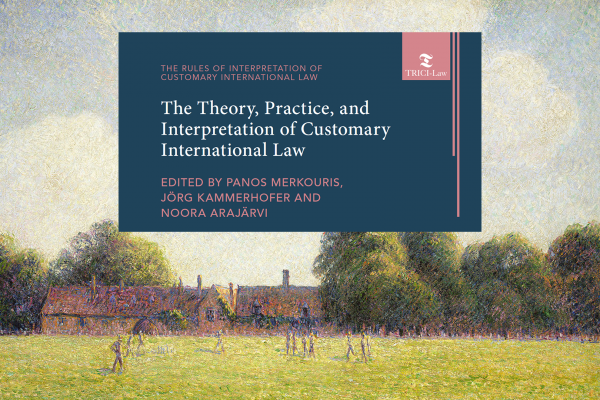Customary international law refers to international obligations arising from established international practices, rather than from written conventions and treaties. It is a body of unwritten rules of public international law that govern conduct during armed conflict, such as international humanitarian law.
Customary international law reflects the repeated and consistent practices that states follow. It is considered an aspect of international law alongside general principles of law and treaties. This type of law is independent of treaty law and is based on a general practice accepted as law.
Customary international law plays a crucial role in shaping global interactions and establishing norms of behavior among nations. Understanding its principles is essential for maintaining international order and resolving disputes peacefully.
:max_bytes(150000):strip_icc()/common-law_sourcefile-1636c3563ba04d88919f87d22c4f0349.jpg)
Credit: www.investopedia.com
Introduction To Customary International Law
Customary international law refers to international obligations that arise from established international practices, rather than from formal written conventions or treaties. It is an important aspect of international law that governs conduct during armed conflicts and is based on unwritten rules.
Definition Of Customary International Law
Customary international law refers to international obligations arising from established international practices, as opposed to obligations arising from formal written conventions and treaties. It is a body of unwritten rules of public international law that governs conduct between states.
Distinguishing Customary Law From Written Conventions And Treaties
Customary international law is distinguished from written conventions and treaties in that it is not codified in a specific document. Instead, it is derived from the consistent and general practice of states, accompanied by the belief that the practice is legally obligatory (opinio juris). This means that customary international law evolves over time based on state practice and the acknowledgement of legal obligation, rather than being created through a formal agreement between states. While written conventions and treaties are created through explicit agreements, customary law arises from the voluntary compliance of states with certain practices.

Credit: voelkerrechtsblog.org
Elements Of Customary International Law
Customary international law refers to international obligations arising from established international practices, rather than formal written conventions and treaties. It consists of unwritten rules that govern conduct during armed conflict and is a cornerstone of public international law. (28 words)
State Practice
One of the key elements of customary international law is state practice. State practice refers to the consistent and general conduct of states in relation to a certain rule or principle. It involves the actual behavior and actions of states in their interactions with each other. State practice can include a wide range of actions, such as the enactment of domestic legislation, diplomatic communications, military operations, and participation in international agreements and organizations.
State practice serves as evidence of the existence and acceptance of a customary international law rule. However, not all state actions contribute to the formation of customary international law. According to the International Court of Justice, state practice must be both consistent and widespread to be considered as evidence of customary law. This means that the practice must be followed by a significant number of states and over a significant period of time.
Opinio Juris
The second element of customary international law is opinio juris, which refers to the belief or conviction among states that a particular practice is legally obligatory. Opinio juris is the subjective element of customary international law that distinguishes it from mere state practice or usage. It is the element that transforms state practice into legal obligation.
Opinio juris requires states to believe that they are legally bound to follow a certain practice, even if they may not actually agree with it. This belief is often demonstrated through official statements, diplomatic correspondence, and legal arguments put forward by states.
The combination of state practice and opinio juris is essential for the formation of customary international law. Both elements must be present for a rule to become custom and be binding on states. Without sufficient state practice or the necessary conviction among states, a rule cannot acquire the status of customary international law.
Examples Of Customary International Law
Customary international law refers to international obligations that arise from established international practices, rather than formal written conventions or treaties. It includes rules of conduct during armed conflict, such as international humanitarian law. Customary law is based on traditions and customs of local communities and is applied in many countries alongside civil and religious legal systems.
Customary International Humanitarian Law
One of the prime examples of customary international law is Customary International Humanitarian Law (IHL). This body of law governs conduct during armed conflicts, ensuring that the dignity and rights of individuals are protected even in times of war. It is a set of unwritten rules that have evolved over time through consistent state practice and widespread acceptance.
Customary International Humanitarian Law encompasses various principles that regulate the behavior of belligerents and provide protection to civilian populations and combatants who are no longer actively participating in hostilities. Some key examples include:
- The principle of distinction, which requires parties to differentiate between combatants and civilians, and prohibits attacks directed intentionally against civilians.
- The principle of proportionality, which mandates that any military action must not cause excessive harm or damage in relation to the anticipated military advantage.
- The prohibition of torture, cruel, inhuman, or degrading treatment or punishment.
- The protection of medical and humanitarian personnel, facilities, and supplies.
These are just a few examples of the numerous rules and principles that make up Customary International Humanitarian Law. The development of this body of law is crucial for maintaining the balance between military necessity and humanity during armed conflicts.
Customary Law In Different Countries
Customary law is a set of laws based on the traditions, customs, or norms of a particular local community or society. While customary law can vary significantly from one country to another, it plays an important role in shaping legal systems worldwide. It often coexists with civil, common, and religious legal systems, offering unique insights into the values and practices of a particular culture.
Examples of customary law in different countries include:
| Country | Examples of Customary Law |
|---|---|
| India | The concept of joint family and the rights and responsibilities associated with it. |
| Japan | The principle of omotenashi, which emphasizes hospitality and respect for guests. |
| United Kingdom | Common law principles that have evolved over centuries and are not codified. |
| Indigenous Communities | Traditional practices and governance systems that have been passed down through generations. |
These examples demonstrate the diverse nature of customary law and how it can be deeply rooted in cultural and historical contexts. Despite the influence of modern legal systems, customary law continues to shape the lives and legal frameworks of communities around the world.
In conclusion, examples of customary international law are not only limited to Customary International Humanitarian Law but also extend to the realm of customary law in different countries. Understanding the role and impact of customary law is essential for comprehending the intricacies of the global legal landscape.

Credit: medium.com
Frequently Asked Questions Of What Is Customary International Law
What Is Customary International Law In Simple Terms?
Customary international law refers to international obligations arising from established international practices, rather than written conventions or treaties. It consists of unwritten rules that govern conduct during armed conflict and is based on state practice and opinio juris.
What Are The Two Elements Of Customary International Law?
The two elements of customary international law are state practice and opinio juris. State practice refers to the actual behavior and actions of states, while opinio juris refers to the belief that the behavior is done out of a sense of legal obligation.
What Are Two Examples Of Customary International Law Quizlet?
Two examples of customary international law are international humanitarian law and international human rights law.
What Is Customary Law Around The World?
Customary law is a set of laws based on the traditions, customs, or norms of a local community. It is applied worldwide in many countries, often alongside civil, common, and religious legal systems. It refers to international obligations arising from established international practices, rather than formal written conventions and treaties.
Conclusion
Customary international law is a crucial aspect of the global legal framework, governing the behavior of states in various contexts. It is based on established international practices rather than formal written agreements. This body of unwritten rules is significant in shaping and regulating conduct during armed conflicts and in upholding human rights.
Understanding customary international law is essential for ensuring compliance and promoting justice on a global scale. By adhering to state practice and opinio juris, nations can contribute to the development and enforcement of this important aspect of international law.

